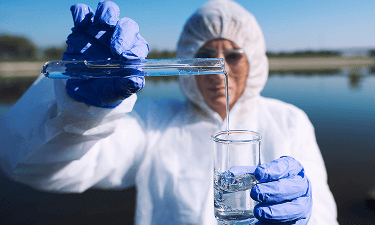The Importance of Innovation in Sustainability and Environmental Testing
By Dawn Mangine
In the face of escalating environmental challenges, innovation in sustainability and environmental testing has become important to global health. Advancements in environmental science and technologies in environmental engineering are driving significant progress. The ongoing development of innovative technologies is crucial for achieving sustainable energy goals, combating climate change, providing access to clean water, and sustaining a circular economy for a sustainable and resource-efficient society.
Innovative Solutions Driving Change
- A circular economy is a resilient system that is good for business, people, and the environment. It depends on the development of new recycling technologies, materials that are easier to recycle, and materials that are biodegradable.
- Perovskite solar cells, floating wind turbines, and algae-based biofuels are gaining traction in the field of renewable energy. They are essential for transitioning to a low-carbon economy and reducing reliance on fossil fuels.
- New methods for purifying and desalinating water are becoming more efficient and cost-effective. These technologies include graphene-based filters, solar-powered desalination, and capacitive deionization.
- Emerging carbon nanofluid technologies and the precise construction of sub-nanochannels are providing new insights into membrane materials for drinking water and wastewater treatment.
- Researchers are exploring the conversion of carbon and other air pollutants into high-value chemicals. The development of catalysts with high reactivity and target product yields is a key innovation in this field.
- Targeted pollutant transformation and detoxification mediated by microorganisms are essential for achieving green and low-carbon technologies in soil and solid waste management.
Emerging Testing and Technologies Driving Solutions
Advancements in environmental testing and monitoring technologies are revolutionizing the field and driving market investment. These technologies enable real-time, high-resolution data collection and analysis, providing critical insights into environmental conditions and supporting effective management and conservation efforts.
Rapid testing methods, which include mass spectrometer, molecular spectroscopy, acidity/alkalinity, and PCR testing, among others, are cost-efficient and can achieve significant efficiency in particulate identification with greater accuracy. They also have high sample throughput and are highly precise.
Conventional methods often require less specialization in equipment and expertise, but often have established regulatory acceptance, making them beneficial to organizations adopting them. These include culture plate methods, biological and chemical oxygen demand, and dissolved oxygen determination, and they can be more accessible and cost-effective.
Leading the Way
Innovation in sustainability and environmental testing is driving significant progress in addressing environmental challenges. From advanced carbon capture and bioremediation to renewable energy and water purification technologies, these advancements are essential for creating a sustainable future and protecting our planet for generations to come. Wherever you are on your sustainability journey, the Fisher Scientific channel is here to help you pave the way.

Environmental Testing Products
From water and sludge analysis to environmental contaminants and materials testing, rely on the Fisher Scientific channel for the right essentials to keep critical workflows in motion. Find safety solutions, equipment, and more to meet your needs.
Content provided by:
